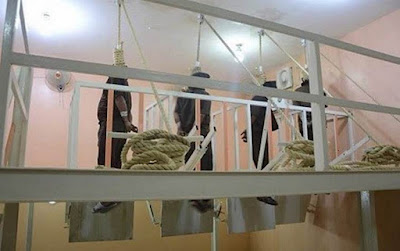 |
| Public execution in Iran |
The UN has announced a new $20 million funding deal for anti-drug operations in Iran, despite drug related executions reaching a 16 year high.
The UN’s new funding deal will more than double UN funding for Iranian counter-narcotics efforts, and will be administered by the United Nations’ Office on Drugs and Crime (UNODC). The money is expected to support a range of law enforcement operations, including the establishment of border posts designed to catch drug mules crossing the country’s border with Afghanistan.
Under Iranian law the death penalty can be handed down to anyone caught with more than 30g of narcotics, and more than 500 people have been hanged on such charges so far this year.
European Governments, such as France and Germany, have historically been the main donors to UN drug programmes in Iran. Contributions were withdrawn by Denmark, Ireland, and the UK over concerns around Iran’s execution rate.
International human rights NGO Reprieve has linked past UN funding to at least 3,000 executions in Iran, including a number of juvenile offenders. Last year UN-funded operations were linked to the execution of a 15 year old boy named Jannat Mir, and a 17 year old boy named Osman Dahmarde who was hanged alongside his mother.
In October 2015 the UN’s special rapporteur on Iran warned that the country’s Government was using UN support to justify its aggressive use of capital punishment, noting that Iranian officials “pointed to statements about its efforts issued by the United Nations Office on Drugs and Crime to demonstrate international support for its approach.”
The UNODC’s own human rights policy stipulates that “If, following requests for guarantees and high-level political intervention, executions for drug related offences continue, UNODC may have no choice but to employ a temporary freeze or withdrawal of support”. However, the agency’s own evaluation of its most recent Iranian funding programme found that “no action has been taken yet in line with UNODC guidance”.
Commenting, Maya Foa, head of Reprieve’s Death Penalty team, said:
“Iran is presiding over an unprecedented acceleration in drug related hangings, while claiming its execution spree is somehow legitimised by UN support. But instead of following its own human rights policy and freezing support for Iranian drug raids, UNODC has responded by doubling its contributions in a generous new funding deal. If the countries funding this programme are to have any credibility whatsoever in opposing capital punishment, they should make their contributions conditional on an end to the death penalty for drug offences”.
Source: Reprieve, December 20, 2015. Reprieve is an international human rights organization.


.jpg)







